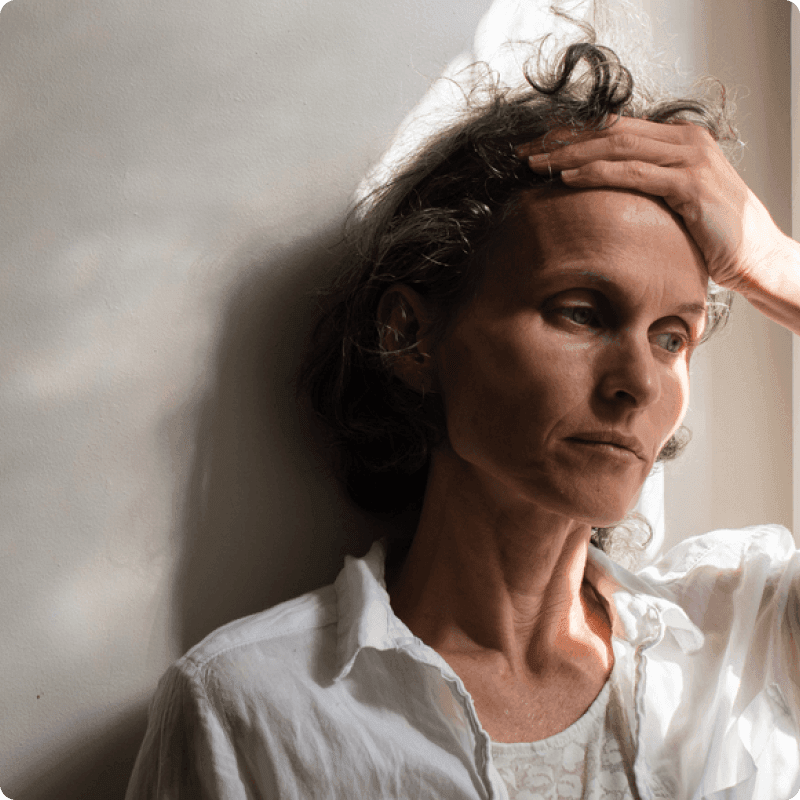Menopause is often described in terms of hot flushes and mood swings, but the truth is, it can impact women in many ways and sometimes leave you feeling downright unwell. From sudden fatigue to aches and pains, menopause can throw your body into a state of confusion.
While menopause can cause a broad range of symptoms, it’s important to listen to your body and your gut during this transitional life stage to ensure your symptoms are assessed, other conditions are considered, and you get the right support and treatment.
In this article, we’ll explore how menopause can make you feel unwell, what symptoms to look out for, and how to know when it’s time to consult a doctor. We’ll also cover steps you can take to improve your well-being and reduce menopause symptoms.
An overview of perimenopause and menopause
Menopause is a natural phase in a woman's life, typically occurring between the ages of 45 and 55, but some women can be much younger, and marks the end of her reproductive years.
Commonly menopause happens naturally as the ovaries gradually produce less oestrogen and progesterone. However, surgical menopause can occur as a result of a hysterectomy with oophorectomy, which results in the immediate onset of menopause, or medical menopause can occur owing to treatments such as chemotherapy or when hormone suppressing treatments are given. Sometimes, early menopause or premature ovarian insufficiency can occur, the exact cause of this in most cases, is unknown.
The defining characteristic of menopause is when you have gone 12 consecutive months without a menstrual period, however this change is often the least impactful, and it is the biological shift which can cause a host of symptoms that leave you feeling less than your best. Symptoms sometimes begin well before any significant changes to periods are noticed, this phase is the perimenopause.
Perimenopause is the phase in the run up to menopause when progesterone gradually starts to decline and oestrogen begins to fluctuate. Symptoms of perimenopause may begin up to 10 years before the last period in some women.
Can menopause make you feel ill?
Absolutely. The changes occurring in your body and the impact these have can affect your physical and mental health. This is largely due to fluctuating hormone levels. During perimenopause and menopause, the ovaries gradually produce less oestrogen and progesterone, two hormones that play crucial roles in various bodily functions.
This change of hormones can affect:
- Thermoregulation (temperature regulation)
- Endocrine system (hormonal)
- Mood and cognitive function (brain and mental health)
- Skeletal and muscular system (bones and muscles)
- Cardiovascular system (heart and blood vessels)
- Vaginal and urinary health
- Oral health
- Digestion including the gut microbiome
With so many bodily functions and mechanisms impacted by menopause, it’s no wonder that many women feel unwell at this time. However, it's essential to remember that while menopause can be responsible for a wide range of symptoms, not all health issues should be attributed to it and it’s important to rule out other underlying causes too.
Common symptoms of menopause
Menopause affects everyone differently, with some women having very few mild symptoms or none whatsoever, while others experience severe symptoms that significantly affect their quality of life.
Some of the most common menopause symptoms include:
- Hot flushes
- Night sweats
- Fatigue
- Insomnia
- Nausea
- Upset stomach
- Aches and joint pain
- Vaginal dryness
- Dizziness or lightheadedness
- Headaches and migraines
- Brain fog
- Memory lapses
- Mood swings
- Anxiety
- Depression
- Irritability
- Loss of self-esteem
- Weight gain
- Skin changes
How to know if it’s menopause or illness
Many symptoms of menopause can also be a result of other health issues, so it isn’t always easy to determine the root cause. For example, both menopause and the flu can cause fatigue, chills, or body aches. However, flu is typically associated with a fever, which isn't a menopause symptom.
The only way to know for sure whether your symptoms are due to menopause or something else is to seek medical testing and advice. It’s a good idea to speak to a doctor if you’re feeling unwell and:
- Your symptoms are affecting your daily life
- You’re under 45
- You have symptoms less generally associated with menopause, such as chest pain
- You have persistent low mood or anxiety
- You’re experiencing chronic fatigue that doesn’t improve with rest
- You have digestive symptoms including cramps, constipation, diarrhoea, wind and bloating which can be intermittent or last for weeks or months at a time
- You have pain that occurs all over the body
- Have severe headaches accompanied by nausea or heaviness at the back of the neck
- Your joints are painful and swollen
- Get shortness of breath or have heart palpitations
- Have irregular vaginal bleeding or heavy menstrual bleeding
- You experience unexplained significant weight loss
Things that can help during menopause if you’re feeling unwell
If navigating menopause and feeling unwell, you might be looking for ways to improve your situation. There are a variety of lifestyle changes and treatments that you can explore that may help you to feel better.
Hormone replacement therapy (HRT)
HRT can relieve many menopause symptoms, but it’s not a one-size-fits-all solution. Hormone replacement therapy works by providing your body with oestrogen or oestrogen and progesterone (and sometimes testosterone) to replace what is naturally being lost.
HRT is generally a safe and effective treatment for menopause symptoms but it isn’t suitable for everyone, and some women prefer non-hormonal options.
Weighing up the possible associated risks of HRT against its benefits in relation to your personal circumstances and medical history is important when deciding whether it’s the right treatment for you.
Herbal remedies
There are many well-known herbal remedies for menopause, although evidence of their effectiveness can be limited. It’s worth discussing supplements and herbal remedies with your doctor if you’re interested in how they might help you. Certain herbal supplements may not be recommended for patients with a past breast cancer history or may interact with other medications.
Herbal remedies that may support menopause include:
- Black cohosh
- Red clover
- Evening primrose oil
- Milk thistle
- Flaxseed
- Ginseng
- Licorice root
- St John’s wort
- Ashwaganda
Nutrition
Eating a varied yet balanced menopause diet rich in vitamins and minerals can help you manage the symptoms of menopause such as nausea, bloating, and hot flushes which impact your physical wellness.
- Phytoestrogens, like those found in soy products may help support hormones.
- Omega-3 fatty acids from fish or supplements may support brain function.
- Low-processed, high-fibre foods can help ease digestive discomfort.
- Calcium-rich foods like dairy products, beans and leafy greens contribute to good bone health.
- Vitamin D3 can support bone, brain, mental and immune health and is recommended as a daily supplement especially throughout the winter months.
- Dehydration can make you feel unwell so make sure you are drinking plenty of fluids.
- Spicy foods can increase the likelihood of hot flushes and night sweats, and upset digestion so try to limit these if you notice this change.
- Alcohol can worsen menopause symptoms so be sure to keep your intake within safe limits – no more than 2-3 units per day and a maximum of 14 per week. Many women notice that even these amounts can make symptoms worse and choose to exclude or drink very minimally.
- Reducing refined sugars can support sweats, energy levels, mood and weight management.
Alternative therapies
Alternative and complementary therapies are treatments that fall outside the umbrella of mainstream healthcare and often take a holistic, whole-person approach to improving how you feel.
Yoga
Practising yoga for menopause has been shown to alleviate both the physical and emotional symptoms of menopause. It can help improve flexibility, reduce joint pain, and promote relaxation.
Hypnotherapy
Hypnotherapy involves guiding the mind into a deeply relaxed state, which can help manage symptoms like anxiety, sleep disturbances, and even hot flushes.
Reflexology
Reflexology for menopause involves therapeutic massage of the feet to improve circulation and reduce stress. Women who practise reflexology often report a sense of overall well-being, experiencing relief from symptoms like hot flashes, headaches, and mood swings.
Cold water swimming
Cold water swimming during menopause can alleviate menopause symptoms, with studies showing anxiety, mood swings, low mood and hot flushes all improving. It is important to do this in a safe, controlled environment and practice controlled gradual exposure.
Cognitive behavioural therapy (CBT)
CBT for menopause can help not only improve physical symptoms of menopause but also have a positive impact on your mental health. CBT helps you reframe your thoughts and develop strategies to better cope with day-to-day life.
When to speak to a doctor
While many menopause symptoms can be managed at home or with lifestyle adjustments, there are times when it’s important to seek medical advice, particularly if it feels as though menopause is ruining your life.
If you're unsure whether your symptoms are menopause-related or if they seem unusually severe, a doctor can help rule out other conditions and ensure other issues aren’t being overlooked.
By listening to your body and seeking the right support, you can manage menopause with more clarity and peace of mind. Menopause Care has a team of experienced menopause professionals who can help you navigate this stage of your life by giving you tailored advice backed by evidence. To get back to feeling like the best version of yourself, book a consultation with a menopause doctor.
What causes POI? - NICHD





